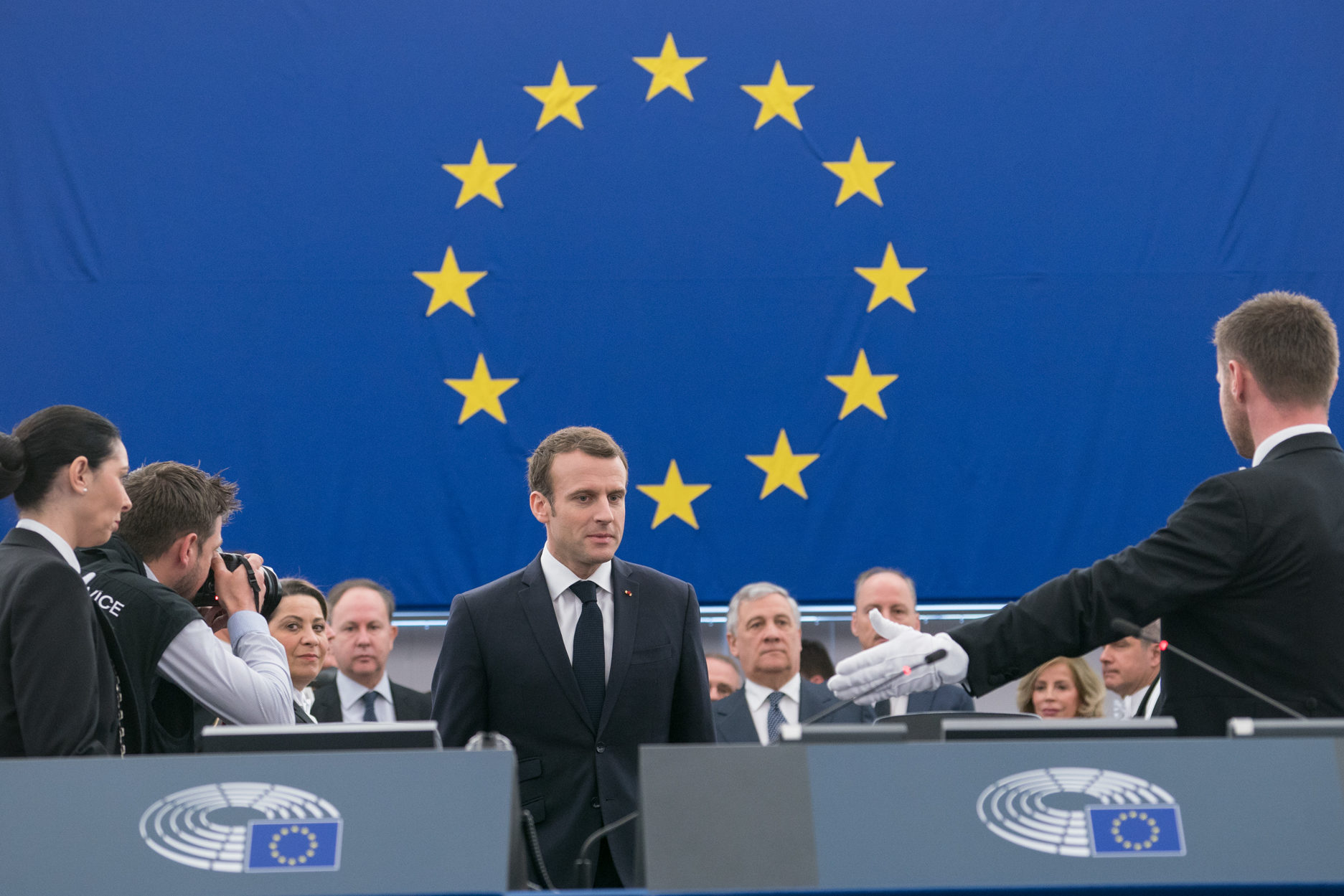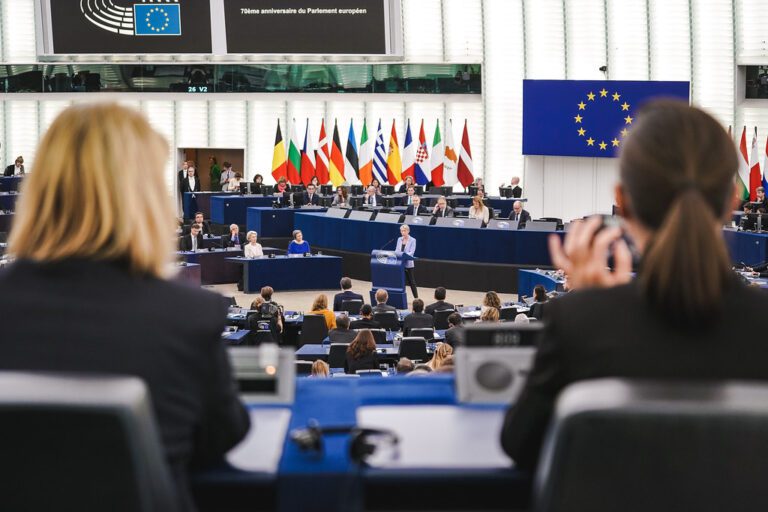
During the last informal meeting of EU foreign affairs ministers in Brest in mid-January, “China’s attitude towards certain Member States of the Union which are experiencing great political, economic and commercial pressure” featured on the agenda.
The somewhat ambiguous title was merely a euphemism for Beijing’s unprecedented economic coercion against an EU member state. This state, Lithuania, has indeed presented the bloc with some uncomfortable questions.
Yet, as France holds the presidency of the Council of the European Union for six months from January 2022, many China watchers in Europe have been left wanting. In the 76-page presidency program, China is mentioned only twice. Neither of the two mentions are particularly ambitious announcements either. The first is a timid reminder that France “will continue to implement the approach adopted towards EU-China relations,” and the second sheepishly declares France “will support the deepening of the foreign policy dialogue with the United States, in particular on China and the Indo-Pacific.”
In his lengthy opening remarks at the December press conference outlining France’s ambitions for the presidency, President Emmanuel Macron made only one reference to China, put on an equal footing with the United States. While discussing technological sovereignty, he asserted “Europeans sometimes have fallen behind when (they) have to compete with the Chinese and the United States of America.” As for the only question asked by journalists afterward, it was not about the bilateral relationship, but about France’s participation in the Beijing Winter Olympics (President Macron describing diplomatic boycott as “very small and symbolic“).
One can legitimately wonder about the lack of ambition of the French presidency with regard to China, especially as the shadow of China looms over nearly all issues, particularly concerning questions of European sovereignty. If the French political class has long had little to gain and much to lose from confronting China, the situation should now be different. Also, it seems that when Paris talks about China in the framework of the presidency, it is largely reactionary. Overall, there is a clear lack of will to take up the thorny issue of the Europe-China bilateral relationship in a proactive manner.
Yielding Ground in the Battle of Narratives
In Paris, some people now describe France’s China policy as “unreadable and inaudible, because it is outdated and insufficiently demanding.” The criticism is not without justification. In particular, the Presidential office and the Foreign Ministry have a real communication problem. It is not understandable, for example, why Paris systematically communicates only several hours after Beijing following bilateral exchanges, allowing the Chinese side to set the framing of the negotiations in international media.
Even worse, Paris sometimes does not communicate at all, as was the case during the last strategic dialogue in January 2022 in which the President’s diplomatic adviser participated. Due to this passivity, the Chinese side is allowed to essentially control communication on the bilateral relationship, and all irritants in the relationship are carefully ignored. The battle of narratives mentioned by the EU’s chief diplomat Josep Borrell in March 2020 is also a communication battle. So far, the Europeans have been losing it without putting in much effort.
However, the issue at hand is more that of form than substance. France no longer avoids the subjects that make Beijing angry and speaks out more openly than a few years ago. As such, there has been a very clear and welcome evolution in the French approach. In his phone exchange with Xi Jinping in October 2021, Emmanuel Macron called on China to lift “the coercive measures taken against EU member states and representatives of the European institutions and parliament.” In November 2021, in an interview with Le Monde ahead of the 8th ministerial conference of the Forum on China-Africa Cooperation, Foreign Minister Jean-Yves Le Drian mentioned China’s “predation” in Africa, the “fool’s bargain” that China imposes through its loans, and the risk of certain African countries coming under Chinese “tutelage.”
On its Weibo account, the French Embassy in China has, on several occasions, openly addressed the issue of human rights. In November, the embassy even relayed in Chinese the Quai d’Orsay’s concerns about the tennis player Peng Shuai, while calling for a transparent investigation into her allegations of sexual assault – the sole foreign embassy to do so. This remains one of the only uncensored mentions of Peng Shuai on the Chinese social network.
Paris has also become an EU leader on security issues vis-à-vis China. France has long taken into account the risk that China poses, including in the Indo-Pacific. This is evidenced by France’s leading role in the adoption of a European cooperation strategy in the Indo-Pacific, the frequent mentions of China in the Armed Forces Strategic Update in January 2021, the deployment of a nuclear attack submarine to the South China Sea to carry out a mission of “strategic interest” in the spring of 2021, and the transit of the French Navy’s intelligence-gathering ship Dupuy-de-Lôme through the Taiwan Strait in the autumn of 2021. Communication through actions is clear, even if the words used are often toned down.
This evolution is the result of a double pressure: from a part of the administration, including the Ministry of Economy, which was previously very favorable to a rapprochement with China for obvious economic reasons, and whose perception of China has profoundly evolved over the last few years; and from a more critical public opinion which calls for more open condemnations of certain Chinese policies, notably in the field of human rights.
Great Ambitions, Limited Results
Beyond communication, the lingering question that remains regards the stated objectives and expected results of France’s overall China policy under Emmanuel Macron. Bilateral trade and investments are the top priority area of the bilateral relationship highlighted by Macron at the beginning of his presidency, directly linked to his domestic priorities.
On the economic front, in particular, there has been some progress – beyond the traditional signing of mega contracts for Airbus before the pandemic. For example, Paris obtained a total lifting of the embargo on French beef, first instituted by China in 2001. France also pushed at the European level for an agreement ensuring the protection of 100 European food products in China, including 26 French ones, and an equivalent number of Chinese products in Europe. France will also be able to continue exporting pork to China if it is affected by African swine fever, from areas still free of the disease, under an agreement signed in December 2021.
However, structural problems in the bilateral relationship clearly persist despite the stated aim of the Elysée to promote the principles of market access, fair competition, reciprocity, and reduced trade tensions. A key issue is that the commitments made thus far by China remain non-binding and abstract. For example, the 2019 Action Plan for Franco-Chinese Relations only mentions that the two countries “wish to rebalance their bilateral economic exchanges upwards.” In this context, while still somewhat ambiguous given the language, it would be reasonable to assume France’s trade deficit would only continue to worsen and China would continue to account for France’s largest bilateral deficit at a whopping €39 billion, or 60 percent of the total deficit.
Moreover, Chinese direct investment in France is often overestimated, to the point of obsessing many local elected officials who too often consider China as the main opportunity deserving of their efforts. Since 2000, France has attracted three times less Chinese investment than its British neighbor, less than its Italian neighbor, and almost as much as Finland, an economy ten times smaller than France’s. The stock of Chinese investment in France (€8.5 billion) is equivalent to Danish investment, and much lower than the stock of Swiss (€92 billion), British (€103 billion), or Dutch (€104 billion) FDI. Finally, in terms of job creation, Chinese investment created fewer jobs than Spanish investment in 2019 and about as many as Canadian investment in 2020.
Making the most of the EU Presidency
Although China is evidently not France’s priority during its presidency of the Council of the European Union, there is a crucial opportunity for Paris to accentuate the current dynamic marked by a salutary evolution in Sino-European relations. In the short term, there are three key areas that France must address.
The first is the indispensable European coordination on China. France has played an important role in recent years, including through a quadrilateral summit in March 2019 with German Chancellor Angela Merkel and European Commission President Jean-Claude Junker during Xi Jinping’s state visit. Yet, other initiatives were not as well received by European partners as they were not coordinated with other member states beforehand. Most notably, it was the case of trilateral meetings between France, Germany, and China, including the one where the conclusion of negotiations on the Comprehensive Investment Agreement was announced in December 2020. It is key for Paris to keep coordinating at the European level as much as possible, engaging all the Member States, to send a clear signal to China that it will not succeed in its efforts to divide Europeans.
The second is supporting the adoption of concrete economic measures that go beyond the simple political support, which is indispensable but insufficient, to a Member State that is subject to unprecedented economic coercion, Lithuania. At the beginning of January, a senior French official mentioned the need to take measures quickly without waiting for the adoption of the anti-coercion instrument under negotiation. In this context, while counter-sanctions may be considered, Europeans should as well try to collectively absorb the cost of economic sanctions. The objective should be to avoid at all costs creating a dangerous precedent that would reinforce China’s use of economic tools for political purposes, including secondary sanctions.
Finally, there is a need to protect Europe’s scientific and technological potential. While the French Minister of the Economy, Bruno le Maire, regularly asserts that “there is no political sovereignty without technological sovereignty,” many cooperative ventures with China today continue to pose a challenge for economic competitiveness and national security. The Member States must equip themselves with a tool to assess the risk inherent in certain cooperation, particularly in the field of dual-use technologies, while Beijing is trying to make the affiliation of certain Chinese partners as opaque as possible, particularly those linked to military institutions.
In 2019, French President Emmanuel Macron spoke of “boldness,” and “risk-taking” as essential to foreign policy. At a time when Chinese pressure on Europe is unprecedented, and Lithuania offers a historical case study, it is crucial for France to be more ambitious and assertive in its relationship with China – on both national and European levels.
Written by
Antoine Bondaz
AntoineBondazAntoine Bondaz is a Research Fellow at the Foundation for Strategic Research, directing the foundation's Korea Program on security and diplomacy as well as the Taiwan Program on security and diplomacy. He also teaches at Sciences Po Paris. He was previously a special adviser to the President of the Delegation for relations with the Korean peninsula of the European Parliament.


